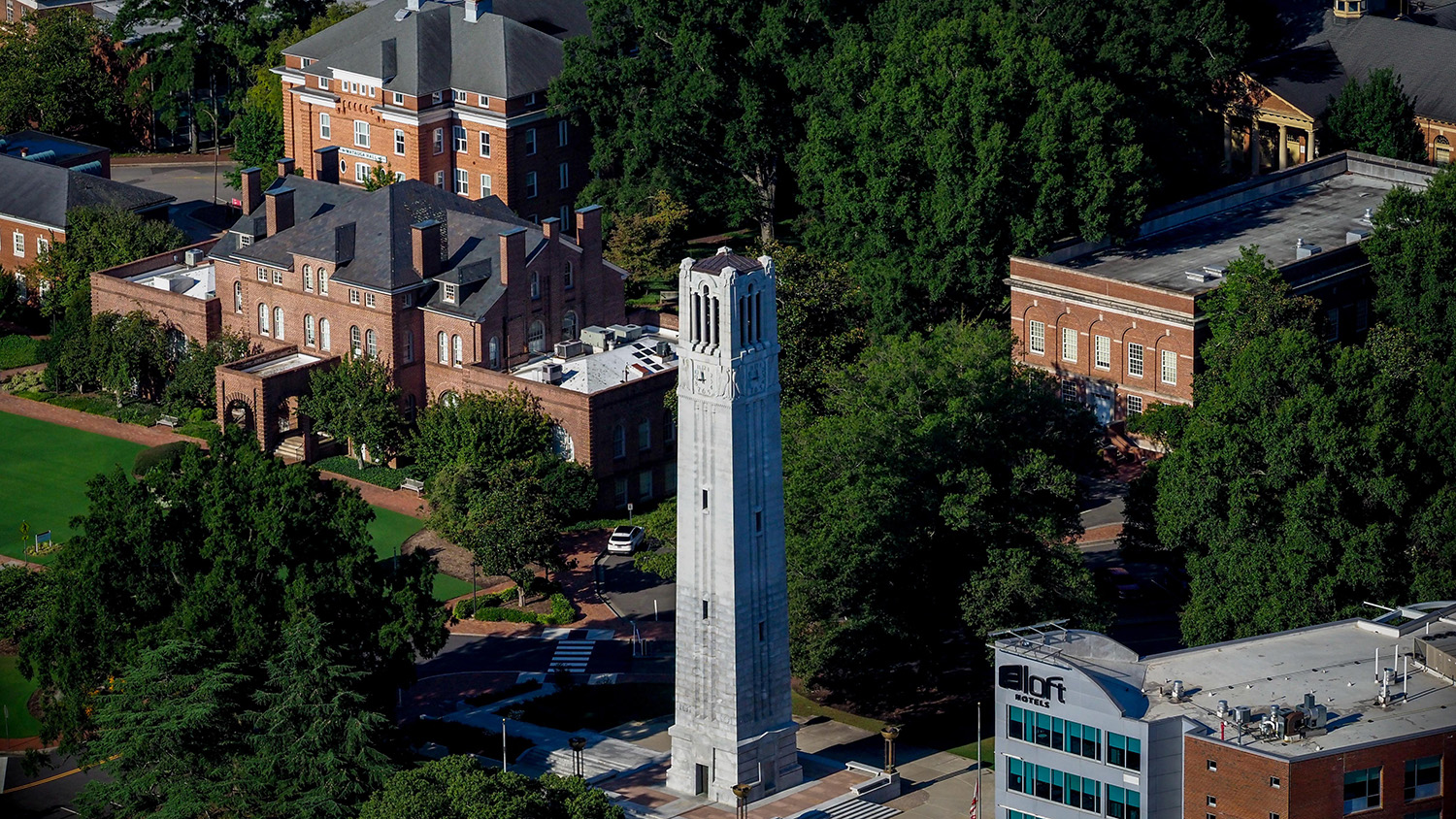Facilitating Interdisciplinary Connections
NC State’s academies elevate research and education by facilitating interdisciplinary connections among faculty, staff and students. The Data Science Academy and Genetics and Genomics Academy seek to further interdisciplinarity on campus through courses, workshops and more.
Both academies launched within the past year, and are well on their way to exponentially increasing their impact on interdisciplinary work at NC State. We took a look at what’s happening with the academies now, and what to look for in the future.
Data Science Academy Updates
The Data Science Academy (DSA) has focused on connecting and supporting stakeholders around NC State. From data science consulting to courses and cross-college conversations, the DSA makes data science accessible to students/learners, researchers, partners and more.
“Anyone can learn to approach information using a data science lens,” said Ray Levy, DSA executive director. “Using data to understand, predict and make decisions can be valuable in any discipline. At NC State, data science is for everyone.”
Through the Partnerships office, Levy meets regularly with industry representatives to partner them with NC State for data science workforce development, bespoke education and research collaboration.
“Innovative data science is at the core of creating a smarter, more connected world,” said Robert Steffler, Vontier Vice President, Data and Analytics. “By partnering with NC State, whose data science programs are among the best in the world, we have access to the next generation of talent and research to accelerate our data analytics and connected customer workflow solutions.”
The DSA will offer more than 20 course sections for the fall 2022 semester, half of which have no prerequisites. From social sciences to humanities to STEM fields, these courses offer many paths into data science. NC State alumni from business and government will teach classes in topics such as natural language processing and data for social good. Courses have already attracted a diverse group of undergraduates, graduate students and faculty from all NC State colleges and 70 programs of study.
Level 1 project-based courses welcome people who are completely new to the subject and might even have been a little scared to try data science. Level 2 classes build on prerequisite skills and Level 3 courses are BYOD – bring your own research data. The one-credit format is much like a workshop — no quizzes, no tests, just practice and a final project. All data science courses are project-based. Students can choose the context for their projects, which allows them to bring together disciplinary perspectives and also see how a tool or concept can be applied across many domains. Courses include:
Biomedical Data Sharing
In this course students will learn to articulate the benefits and potential risks of biomedical data sharing. They will explore the evolution of data sharing policy, from initial conception to current and future considerations.
Data Communication
This course will help fine-tune the student’s awareness regarding the use of discipline-specific language, and introduce skills to present scientific results and concepts clearly, unambiguously and with a minimum of jargon.
Intro to R/Python for Data Science
This course develops the introductory skills in R and Python that students need for data science. Topics include data types, data structures, control structures, good coding practices and reproducible coding.
Data Science for Social Good
Data Science for Social Good will introduce students to the growing use of data science in the social impact space, drawing from real-world examples aligned with the United Nations Sustainable Development Goals. These examples will span practice areas and approaches, including machine learning, natural language processing, and image recognition. Students will discuss the challenges of implementing data science for social good solutions, including considerations of community involvement, bias, and equity and identify best practices.
Social Media: Data, Ethics and Theory
Although social media services have democratized expression and provided digital space to build virtual communities, they have also fundamentally modified media consumption and social behavior, potentially exposing users and non-users alike to myriad risks. Students will discuss the socio-cultural impacts of social media and explore the ways in which individual agency is influenced by social media systems and practices.
In addition to courses, DSA offers seed grants that require that teams be interdisciplinary and that the workshop or research they propose integrates disciplinary approaches. This year, DSA is broadening the list of activities people can propose; additional opportunities to participate in proposal ideation workshops for interdisciplinary research teams are also in the works.
In partnership with the NC State University Libraries, the DSA offers data science consulting, provided by an interdisciplinary team of Graduate Research Assistants. They can help with small problems that take just one meeting and an hour or so to resolve; they also can take on some projects that require several meetings over a semester. This help is available to anyone in the NC State community. Researchers can also work with DSA to write data science GRA consultants into their grant proposals.
What’s Next for DSA
DSA hosts a Data Science Career Expo each semester, open to the entire NC State community. In addition to the career expo, DSA hosts various workshops and panel discussions. Faculty and staff are building programs in K-12 outreach with NC State’s Science House and have several initiatives in data science and agriculture. On April 8 DSA held the inaugural DataFest @ NC State, similar to a hackathon, with more to come in the future. And, save the date for June 3 for the first panel in DSA’s summer series “Hot Topics in Data Science.”
Over the next year, DSA plans to build on early successes and the excitement building across campus. The academy will be working toward a strategic plan that articulates a vision for data science at NC State that benefits stakeholders across the state. To inform strategic planning and program development, DSA is launching a faculty and staff survey to discover more about data science at NC State. The academy wants to know what they can support and how the DSA can best serve NC State.
Additionally, DSA will scale up current initiatives, including continuing to work toward formalizing an undergraduate minor and a certificate in data science; and building internships for social good in nonprofits and government. DSA’s first annual report will reflect on what’s happened over the past year, along with a focus on building a strong future.
Genetics and Genomics Updates
The Genetics and Genomics Academy, established in late 2021, builds off of NC State’s historic strengths in genetics education and research. Only half a year into its formal existence, the academy seeks to bring together centers, institutes, related initiatives and all NC State’s colleges to collaborate on interdisciplinary initiatives.
On April 18, the Genetics and Genomics Academy will host its last seminar of the spring 2022 semester. Molly Burke of Oregon State University will give a talk on Evolution in a test tube: what can experiments with yeast teach us about the genetics of complex traits?
Additionally, the Genetics and Genomics Scholars program is finishing up its second year. Students in the program take a six-credit survey course in the fall and two three-credit courses in the spring (genomic data science and professional development). They also rotate through three labs. Students are so enthusiastic about the program that they attract many new applicants, and this year the program had over 170 applicants for 15 fellowship positions.
The program was developed by an executive committee and curriculum Committee, led by Martha Burford Reiskind, using a consensus model and implementing innovative methods for graduate training and professional development in genetics and genomics. The program serves as an academic resource for students and prepares them for future careers in the sciences.
The students come in their first year to the program and represent 16 different affiliated Ph.D.—granting programs. The program builds on this interdisciplinary community and leads students through a first-year curriculum that includes innovative teaching practices, community-based learning environments, and addresses questions of the intersection of genetics and genomics, and societies and ethics.
The first semester is a broad survey course that highlights important fields in genetics and genomics and culminates in a “BIG IDEAS” team science project. In the second semester, scholars work on professional development and science communication and do a much deeper dive into the ethical considerations of genetic and genomic research. They also have a big data, project-based course in the spring. The program includes cohort building activities and each new graduate student has a graduate peer mentor.
“Students gain critical skills in working across disciplines, and all axes of diversity, to learn how to collaborate effectively in tackling some of the big questions in science and society. Moreover, we look at the whole student and help them gain skills early on that will help them not only navigate graduate school but in their careers after NC State,” said Reiskind. “We have students that are destined for academics, industry, NGOs, government jobs, or the private sector. The students’ feedback on these experiences is absolutely fabulous.”
The Genetics and Genomics Academy deepens its commitment to all students through a grant program for graduate students and postdoctoral scholars, who mentor undergraduate students on research conducted over a summer. The program currently has 13 teams for the upcoming summer session.
The teams will co-develop a project and come up with a budget. Graduate students and postdocs will mentor enthusiastic internal or external undergraduate students in writing a short proposal, get experience with budgeting, train their mentees in relevant experimental and/or computational techniques, supervise the work, and assist with data analysis and interpretation.
This presents a unique opportunity for both sides to learn the basics of project management, from conception to completion, that will culminate in a symposium presentation and/or a journal publication.
Often, students working in a research lab get plenty of guided hands-on experience and some design (or assist in the design of) their projects and day-to-day experiments. In contrast, rarely do students get to think of the financial side of research.
“This is an eye-opening experience for many participants to learn how much a small tube of a reagent costs, or how expensive commercial kits and other research supplies are,” said Anna Stepanova, program manager and associate professor in the Department of Plant and Microbial Biology. “Being able to do good science on a limited budget is an important skill in research. Another unique side of these mini-grants is that the postdocs and graduate students receive a stipend along with their undergraduate trainees. I view it as a small token of appreciation for the extra work that our hard-working lab members do on top of their own research projects.”
This mini-grant provides useful professional development opportunities for both the mentor and the mentee, and is a helpful resume booster for both. The Genetics and Genomics Academy is funding 13 such teams that will work this summer on a wide variety of projects, from gene annotation in cotton, to characterization of yeast strains in wild nectar, to understanding the genetics of sex determination in fish, to hormone biosensor optimization, to functional analysis of brain organoids, to development of a genetic transformation technique.
What’s Next for Genetics and Genomics
The Genetics and Genomics team recently completed a process to address the academy’s four main focal areas:
- Enhancing the genetics and genomics graduate student experience;
- Providing all non-biology students at NC State with the opportunity to become literate in genetics and genomics;
- Developing more genetics and genomics multi-investigator proposals in areas where NC State holds a comparative advantage; and
- Enhancing genetics and genomics literacy for North Carolina’s citizens.
“These discussions have given us good ideas about how to move forward in the fall,” said Gould. “One thing we are planning is the offering of one-credit topical undergraduate courses that will attract non-biology majors (e.g. Knowing the genetics of your pet).”
Genetics and genomics is an inherently interdisciplinary field with tools being applied to solving complex problems in human health, agriculture, conservation and more. It brings together researchers who work at the nano scale with those who work on ecosystem dynamics.
Evolution is happening all around us, from that in the COVID virus to that of animals and plants adapting to climate change. A deep understanding of G&G is important to making predictions about such evolutionary events. With the advent of genetically engineered foods and human gene therapy, there are many societal and ethical questions related to new applications of genetics and genomics. That is why the Genetics and Genomics Academy is investing in and collaborating with the Genetic Engineering and Society Center, integrating the four main focal areas in their work.
Working Together for Interdisciplinary Training
Both the DSA and the Genetics and Genomics Academy work to train tomorrow’s interdisciplinary leaders through courses and curricula, as well as exposure to university partners, many of which will be hiring graduates with a wide range of experience.
“As we think about the grand challenges facing our world, we need the multiple perspectives and the cross-talk that interdisciplinary work integrates,” said Levy. “The Data Science Academy was created to network the colleges of the university around the points of the NC State mission. As we strive to empower more stakeholders to turn data into insights, the respectful inclusion of many perspectives is a first step to weave equity into the fabric of our work.”
University partners are looking for interns and employees who are curious, flexible, self-motivated and able to communicate with people who have different areas of expertise. One reason the Data Science Academy courses are all project-based is that students have agency over their work and are able to tell personal stories about what they tried, how they struggled and what insights they gained from their project.
“We have brought together research teams and built communities of practice,” said Levy. “Students report that our classes and career fairs have landed them internships and jobs. We are dedicated to providing opportunities for everyone to level up in data science.”
Gould echoes Levy’s sentiments, noting that it is now well accepted that students are the glue that hold interdisciplinary efforts together. Through the Genetics and Genomics Scholars program, the interdisciplinary seminar series and faculty/student retreats, students develop professional networks with mentors across departments and colleges, and bring these networks back to their labs, and then into the workplace.
From the start, the Data Science Academy and Genetics and Genomics Academy have forged a strategic path forward for interdisciplinarity at NC State. Throughout all the academies’ activities and initiatives now and in the future, they are showcasing a message of interdisciplinary collaboration and education for all that benefits the campus community, state and industry alike.
“I’m thrilled to be able to work with both academies to achieve their student-centered goals,” said Interim Senior Vice Provost for University Interdisciplinary Programs Rob Dunn. “And what is even more exciting as we look to the future is that these are just two of a growing number of university interdisciplinary programs at NC State.”
In a time in which the world’s problems and potential employers both demand interdisciplinary training, NC State is rising to the challenge.


